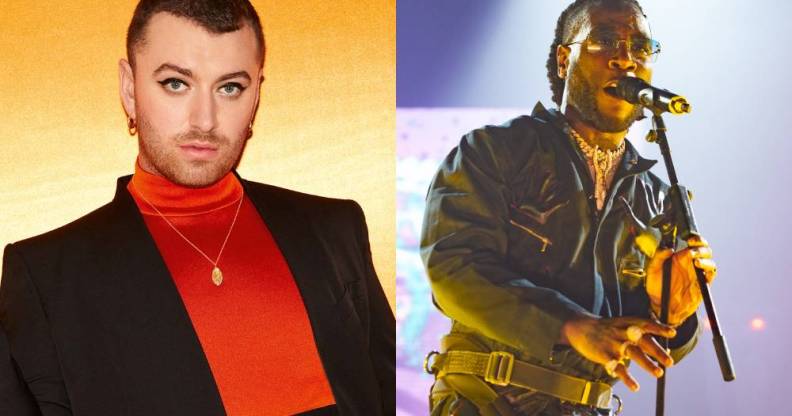Sam Smith’s collaboration with Nigerian artist Burna Boy is exposing a massive double standard, say queer fans

Sam Smith and Burna Boy have collaborated for a new single. (PH/Getty)
Sam Smith is dropping a new single, “My Oasis”, with Nigerian superstar Burna Boy, which has prompted a mixed reaction from queer citizens of the west African nation.
The British singer released a teaser for the track, the first to be released since they postponed their third studio album, originally named To Die For, and announced it would be retitled.
“My Oasis” will be released Thursday evening (July 30) and is set to feature Burna Boy, who became the first Afrobeats singer to sell out Wembley Arena after the release of his acclaimed fourth album last year, and has previously collaborated with Beyoncé and Stormzy.
But the announcement prompted passionate debate among queer Nigerians, who had conflicting feelings about the team-up.
Uhm Sam I think I speak for the Nigerian queers when I say we don't know how to feel about this ? https://t.co/gvhzJgUzOP
— ᴛᴏᴍɪᴅᴇ ☥ (@heli0si) July 29, 2020
Sex between men is punishable by up to 14 years in prison in Nigeria, and homophobia is rife in society — causing it to be named the most dangerous place in the world for queer tourists.
Acceptance in society is gradually increasing. A 2019 study found that 27 per cent of Nigerians believe queer people should have equal rights – up from 17 per cent two years earlier.
More than half – 57 per cent – “strongly” supported the country’s sodomy law. While high, it showed a marked fall from 2017, when three-quarters of those surveyed supported the law.
Only 30 per cent said they would accept a gay family member, up from 13 per cent.
Reaction to Sam Smith Burna Boy collab shows double standard, says Twitter.
One Twitter user questioned why there was a “sudden” interest around Sam Smith’s music despite their sexuality, when Nigerian LGBT+ artists are so often ignored.
“Where is this energy when LGBTQ+ people in Nigeria are just minding their business?” they tweeted. “Why don’t you just ignore and face the art they’re creating?”
Nigerians are suddenly interested in Sam Smith’s music and not the sexuality.
But where is this energy when LGBTQ+ people in Nigeria are just minding their business? Why don’t you just ignore and face the art they’re creating?
You’all are jokes really.Double standards oshi— Son of the Rainbow AKA LGBTQ+ CLASS CAPTAIN?️? (@Blaise_21) July 29, 2020
One Twitter user called the “sudden interest” narrative “dead”, stating that Smith is already popular in Nigeria.
However others said that this only underlined the point, that it is queer Black Nigerians who fail to garner support from mainstream society, while white artists such as Smith and Elton John are supported regardless of their identities.
What he is trying to say is that Nigerians are willing to separate the sexuality from the artist as long as the artist happens to be *checks notes* yt or foreign but lose that same energy when it comes to local artists or their fellow queer citizens— mum! look, another phagot in our living room (@gayforprada) July 30, 2020
This Burna collab w/ Sam Smith shows again that Nigerians will kill their own people for being gay but still celebrate and gladly support queer people from Western countries.
They love Elton John but will rather die than let a Nigerian in Nigeria have the same freedom Elton has.— Alphabet Mafia, G Division☭ (@Kayode_ani) July 30, 2020
Point still stands though. Why is Sam Smith loved but the the Nigerian gay man is treated so horribly?
— em (@_emvy) July 30, 2020
Some pointed to Bobrisky – a rare trans celebrity in Nigeria – as an example of queer folk who receive hatred simply for existing.
Bobrisky was arrested in 2017 when she came out as gay, and has suffered intense transphobia since coming out again as trans.

